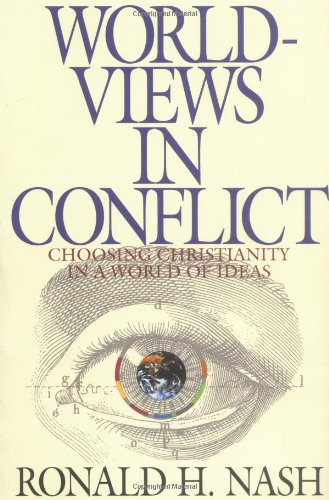A Brief Book Summary from Books At a Glance
About the Author
Ronald H. Nash was professor of philosophy and theology at Reformed Theological Seminary, Orlando. He was a prolific author and wrote many widely used books dealing with theology and philosophy of religion.
Introduction
Worldviews in Conflict is an introductory book on the subject of the Christian worldview and worldview analysis. Nash distills his more academic philosophical writings into a readable introduction that is comprehensible without being simplistic. He explores tests for worldviews, shows some of the problems with naturalism and the New Age movement, and presents reasons and evidence for the strength of the Christian worldview.
Table of Contents
Preface
Chapter 1 What is a Worldview?
Chapter 2 The Christian Worldview
Chapter 3 How to Choose a Worldview
Chapter 4 A Further Look at the Test of Reason
Chapter 5 Christianity and the Test of Reason
Chapter 6 A Further Look at the Problem of Evil
Chapter 7 Naturalism
Chapter 8 The New Age Movement
Chapter 9 The Incarnation and the Resurrection
Chapter 10 Winning the Battle in the World of Ideas
Summary
Chapter One: What is a Worldview?
Every mature person has a worldview, even if they are not consciously aware of what it is. A worldview is a set of beliefs about the essential issues of life. Our worldview is a conceptual scheme through which we interpret reality. Many conflicts about ethics and other fundamental issues are really conflicts about competing worldviews. People can share the same basic worldview commitments without agreeing on every possible secondary and tertiary matter. Christians need to see that Christianity is a full worldview, not just a collection of religious doctrines. Believers need to learn about philosophy so that they can see the coherence of their worldview and the problems that attend other worldviews. Every person has a set of presuppositions, which are basic axiomatic commitments that guide their thinking and reasoning.
There are non-theoretical reasons why people hold to certain theories—reasons that are rooted in personal biases and psychology. Some people have hard hearts and hold religious and ethical biases against Christianity but, as in the case of the Apostle Paul, nobody is beyond conversion. All worldviews have views on at least five major subjects. The first is God. People have an incredibly wide range of views about God’s existence and character, some of which are so diverse that they separate people into different worldviews. The second area concerns the nature of ultimate reality. It asks questions about the nature of the world and its relationship to God. The third subject is about what knowledge is and how we can know things. The fourth topic is morality and ethics. Most people are more aware of their views on ethics than they are of the other worldview subjects, but there are still questions regarding what makes something ethical and what criteria we should use in making ethical judgments. There is debate about whether ethics is objective or subjective. The fifth area concerns human nature. What are human beings? There are other important issues for everyone to consider, and worldviews must be able to explain the data we find around us. Christians can share the same worldview and yet still differ on certain theological and ethical issues.
Chapter Two: The Christian Worldview
We need to understand the basic content of the Christian worldview. Christianity is theistic, teaching that there is one God. God is a Trinity, three centers of consciousness sharing one nature. The Bible teaches that this one God is the only God and that he created the world out of nothing. God is not identified with the world or dependent upon it in any way. He is sovereign over it and active in it. Although Christians can differ on academic points on epistemology (i.e. the subject of knowledge), Christians cannot be absolute skeptics, or believe…
[To continue reading this summary, please see below....]The remainder of this article is premium content. Become a member to continue reading.
Already have an account? Sign In
